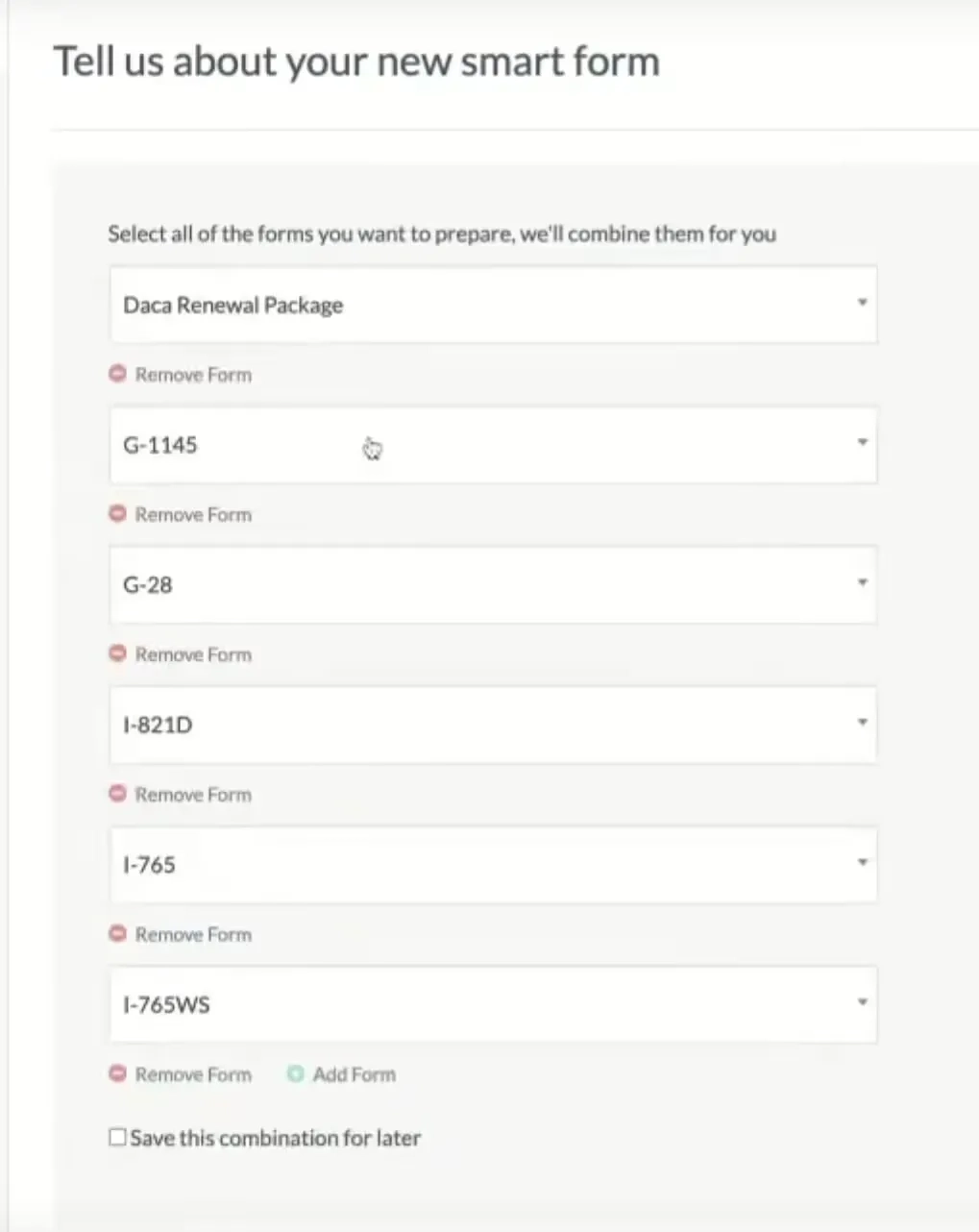Unlike static paper forms, smart forms can be customized so that businesses collect the information they need from their client faster and easier. The process helps ensure that you get the right data, faster, and with fewer errors.
For businesses, where every detail counts, implementing smart forms can be the driver for both improved workflow and client satisfaction.
What is a Smart Form?
When you’re dealing with an influx of clients, you know how important it is to streamline the intake process for your clients and your business. Smart forms allow clients to easily input their information through any device, with the data securely stored in a database.
For instance, instead of sifting through irrelevant sections about work visas when your client is applying for a family-based immigration visa, you can tailor forms and narrow down the questions. This helps ensure that you’re asking only what's necessary such as their relationship to the petitioner, their immigration history, and any supporting documents they might need.
How Smart Forms Work
One of the biggest advantages is how seamlessly smart forms integrate with case management systems. Once a client completes the form, all the data—from their history to contact details—is instantly uploaded into your system. This process reduces the chances of errors that come with manual data entry and makes your work more efficient.
If you work with clients who speak different languages, smart forms can be configured to support multiple languages—ensuring that clients can comfortably provide accurate information in the language they are most familiar with.
Smart Form Example
Preparing forms simultaneously is a breeze if you have the right tools. Below is a sample of a DACA renewal package designed to gather all the right documents.

When a client begins filling out a smart form for a DACA renewal, the form only shows questions relevant to that specific case.
The smart form can also flag unanswered or improperly inputted questions, and allow the attorney to comment on specific fields—ensuring all necessary information is collected before submission. Once complete, the form can sync with the firm's case management system, saving time on manual data entry and reducing errors.
Smart forms can also be used for online lead generation. When a potential customer visits a website, they may be asked a few initial questions, such as the type of service they’re interested in (e.g., product purchase, customer support, or sales inquiry).
Based on their needs, you can prepare a collection of relevant prospect forms so that both you and the potential client can set out on the right foot.
Benefits of Smart Forms
The customization and collaboration benefits of smart forms save time and time help clients have a better experience. But there are the other major benefits as well.
Higher Conversion Rates
Focused and simplified forms help increase completion rates, which can lead to better conversion rates.
Better Data Accuracy
For example, if you are gathering data for a specific visa type, you can tailor the form to only display questions related to that visa. This ensures accurate information, making the data more useful and reliable.
Improved User Experience
Smart forms adjust in real-time based on what the client enters, showing only relevant questions. For immigration lawyers, this means clients see only what’s needed for their specific visa or case. It saves time, avoids confusion, and makes the process smoother for everyone.
Streamlined Workflows
One of the key advantages of smart forms is that it can automatically send data to the right department, removing the need for manual data entry. For example, when a customer places an order, their shipping information is immediately sent to the fulfillment team. This automation speeds things up, reduces the chances of human error, and makes your operations run more smoothly.
Boost in Productivity
By automating repetitive tasks, smart forms reclaim time so your team can focus more on client cases. Instead of spending hours manually inputting information, attorneys can rely on smart forms to do that job automatically. This improves productivity, reduces mistakes, and lets your team focus on growing the business and engaging with clients.
Types of Smart Forms for Immigration Law Firm
A smart form in legal practice uses automation and conditional logic to streamline the collection of client data and the completion of forms and legal documents. Smart forms are capable of guiding users, who may be law firm employees or clients, through the process by asking relevant questions and tailoring the form’s content based on the user's responses.
Features of smart forms typically include:
Auto-population: Information previously provided or stored in a system can automatically populate certain fields, reducing repetitive data entry.
Conditional Logic: Depending on the responses to certain questions, new sections or questions may appear, ensuring that only relevant information is requested.
Error Prevention: Validation checks can prevent the submission of incomplete or incorrect information by guiding users to provide accurate data.
Integrations: Smart forms often integrate with case management software, allowing seamless data flow and document generation.
Immigration lawyers can benefit from using several types of smart forms.
USCIS and other Immigration Forms
Smart forms may be used to collect the specific data that is needed to complete government immigration forms. There are smart forms to collect data needed for the immigration forms used by USCIS and other agencies involved in administering immigration laws such as EOIR, DOS and DOL.
Some major advantages of using smart forms this way are:
Auto-Population of Data: Immigration cases often require filing several government forms together. A smart form, in the format of a web questionnaire, can ask all the questions to collect the data needed for a combination of government forms without any repetition and then populate that data wherever it’s needed on the forms.
Client Collaboration: Another important advantage of using smart forms for government immigration forms is that they allow for collaboration through shared access to the smart form, thereby allowing data to be entered by both employees of the law firm and their clients. Access may be granted to clients on a client portal or by sharing a link by email, text message, or through other means.
Conditional Logic and Dynamic Fields: Depending on the type of immigration case, certain fields or sections of forms might be irrelevant. For instance, a naturalization application based on marriage to a U.S. citizen will require different details than an application based on qualifying military service. Smart forms apply conditional logic, hiding or revealing sections based on user responses.
These advantages result in saving many hours of labor when preparing immigration forms and also help to reduce inaccuracies that can result from repetitive manual entry of data entry across multiple immigration forms.
Client Intake Forms
Another type of smart form is a client intake form. A law firm often wishes to collect client data at the commencement of the representation. This may be at or prior to the initial consultation, but will definitely occur once the law firm has agreed to represent the client. Law firms desire to have customizable intake questionnaires in which they can choose the specific questions to ask, and add custom questions that they’ve written themselves to fill in any gaps in understanding the client’s case or background.
Many immigration clients may prefer to complete intake forms in their native language. Smart forms can be designed to offer multilingual support, allowing clients to select their preferred language. This can improve the client experience and ensure that the information provided is accurate, as clients are more likely to understand the questions in their native language.
Immigration cases often require a significant amount of supporting documentation, such as passports, visas, financial records, and family documents. Smart intake forms allow clients to upload required documents directly through the form interface, making it easy to submit all necessary materials in one place.
Another important benefit of smart forms is their capacity for data security. Immigration cases involve sensitive personal information, such as Social Security numbers, immigration history, and family details. Smart forms ensure that all data collected is encrypted and stored securely, ensuring compliance with confidentiality requirements.
Client Questionnaire Forms
Law firms can use smart forms for client questionnaires to gather feedback in a structured, efficient, and personalized manner.
For example, when surveying clients about their satisfaction with the firm’s services or how they learned about the firm, smart forms streamline the process by dynamically adjusting questions based on client responses. For example, if a client indicates they heard about the firm through a referral, the form can immediately display follow-up questions asking for details about the referral source. This conditional logic reduces unnecessary questions, making the process smoother for clients.
Additionally, smart forms can auto-populate fields with client information already on file, such as the type of case or the attorney assigned, ensuring that clients don’t need to repeat known details. This personalized approach makes the form more user-friendly and efficient, improving response rates and the quality of feedback.
Finally, smart forms integrate with data analytics tools to automatically compile and analyze results. This allows firms to quickly assess client satisfaction trends, identify areas for improvement, and measure the effectiveness of marketing efforts based on how clients found the firm. By using smart forms in this way, law firms can collect valuable data in a manner that is both convenient for clients and insightful for business growth.
Payment and Fee Agreement Forms
Smart forms can be extremely effective for payment and fee agreement forms in an immigration law firm by automating and streamlining the fee arrangement process, ensuring compliance, and enhancing client convenience.
Immigration cases vary in complexity, and the fee structures may differ depending on the type of service (e.g., family-based petitions, asylum applications, or naturalization). Law firms can set up their standard fee agreements as templates and then auto-populate client details collected through smart forms such as client intakes into the fee agreement rather than manually entering those details. Beyond that, smart forms can be set up to offer customizable fee agreement templates that adjust based on the type of service selected by the client.
Smart forms can integrate with payment processing platforms such as LawPay, to offer various payment options, including credit cards, bank transfers, or installment plans. Based on the client’s selection, the form can dynamically present different payment methods, making it easy for clients to choose the option that best suits their needs.
Immigration law firms need signed fee agreements before proceeding with a case. Smart forms can include integrated e-signature functionality, allowing clients to review and sign the fee agreement electronically. This makes the process more efficient and convenient for clients, especially those who may be located in different parts of the world.
Managing Smart Forms in Immigration Law Firms
Managing immigration cases often involves handling long and complex forms, which can be a hassle for both lawyers and clients. Smart forms offer a modern solution that reduces manual processes, improves accuracy, and ensures compliance with immigration laws.
Challenges of Traditional Forms in Immigration Law
Traditional immigration forms often bring about challenges for both legal professionals and clients. These forms can be long, confusing, and full of legal jargon that makes it difficult for clients to complete them correctly. This can be especially true for clients unfamiliar with legal terminology or those who are non-native speakers, the experience can be overwhelming. As a result, this can lead to delays and multiple rounds of communication to fix mistakes.
Additionally, static forms require all clients to answer the same questions, even if many don’t apply to their cases. This adds unnecessary steps to the process, leaving both clients and lawyers needing to sift through irrelevant data.
How Smart Forms Help Immigration Law Firms
Smart forms simplify the intake process by allowing firms to gather relevant information upfront. While smart forms don’t automatically adapt in real-time, they can be set up to focus on case-specific data. For example, a firm handling a family-based immigration case can use a smart forms app or a complete system like Docketwise to tailor each section.
Customizing Forms for Specific Needs
Instead of forcing clients to wade through unnecessary questions, smart forms allow law firms to create specific versions of forms for different visa types. For example, when handling a DACA renewal, the form would focus solely on questions related to that case, making it far easier for the client to complete. This improves both efficiency and the overall experience, as clients aren’t bogged down by irrelevant details.
Improving Data Accuracy
With smart forms, data accuracy increases as clients are prompted to fill in only the relevant information. If a client skips a critical field, the form can flag it for follow-up. Lawyers can add comments or instructions directly to the flagged areas, allowing the client to correct errors without needing to re-complete the entire form. This process helps reduce errors and ensures that all required data is collected before the form is finalized.
Maintaining Compliance with Immigration Regulations
Smart forms can be set up to ensure that all necessary legal information is collected, helping immigration law firms comply with current regulations.
Boost Productivity with Docketwise Immigration Smart Forms
Smart forms make life easier for immigration law firms. They help collect accurate data, reduce errors, and are easy to fill out for clients.
Also, by streamlining data collection, smart forms eliminate time-wasting manual entries, ensuring that the right information is collected right away. Smart forms help law firms save time, boost productivity, and improve overall user satisfaction.
When it comes to immigration forms, Docketwise is the go-to solution for immigration law firms looking for an efficient way to manage client data. With pre-built templates for different visa types, conditional questions that change based on client answers, and secure data storage, Docketwise offers one of the best smart form features for immigration law firms, as well as smart forms lite.
Schedule a demo today to learn more about how Docketwise can help streamline your firm’s process for handling immigration forms!
Carve Your Niche in Immigration Law
Unlock the potential of your personal brand and set yourself apart in the world of immigration law. Harness the tools, strategies, and insights to become the go-to expert in the immigration law landscape.
Download Now
About the author

Justin FisherContent Writer
Justin Fisher is a content writer and SEO strategist for leading legal software companies, including MyCase, Docketwise, and CASEpeer. He specializes in writing about emerging legal technology, financial wellness for law firms, and more.
